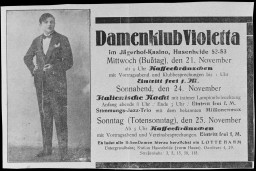You searched for: 聖馬力諾谷歌關鍵詞推廣【TG飞机:@bapingseo】INS,FACEBOOK全世界推广开户【TG电报:@bapingseo】谷歌收录哪里查【Telegram:@bapingseo】哪里有宝博体育官网app下载微笑棋牌4意甲买球软件下载足球世界杯在这个网址买外围?a9KAgj/Bf44cV.html
<< Previous | Displaying results 151-160 of 299 for "聖馬力諾谷歌關鍵詞推廣【TG飞机:@bapingseo】INS,FACEBOOK全世界推广开户【TG电报:@bapingseo】谷歌收录哪里查【Telegram:@bapingseo】哪里有宝博体育官网app下载微笑棋牌4意甲买球软件下载足球世界杯在这个网址买外围?a9KAgj/Bf44cV.html" | Next >>
-
Abdol Hossein Sardari (1895–1981)
ArticleIranian diplomat Abdol Hossein Sardari gave critical assistance to Iranian Jews in occupied France (1940-1944) to protect them from Nazi persecution.
-
What Groups of People did the Nazis Target?
ArticleJews were the primary targets for mass murder by the Nazis and their collaborators. Nazi policies also led to the brutalization and persecution of millions of others.
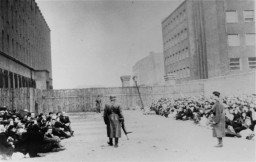
-
Israel Milkow
ID CardIsrael was born to a religious Jewish family living in the town of Slonim. He was called Yisroel by his Yiddish-speaking parents. Israel's father, Lazar Milkow, was a baker who supported his family on a meager income. 1937-39: Israel's grandparents and many of his mother's relatives lived in a nearby village called Kaslovchina. Each summer one of the Milkow boys was invited to stay in Kaslovchina with their Uncle Herschel who worked as a farmer and horse trader. In September 1939 Slonim became part of the…
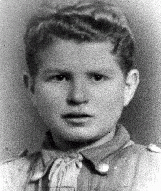
-
Betje Jakobs
ID CardBetje and her sister Saartje were born to Jewish parents in the town of Zwolle in the Netherlands' north central province of Overijssel. Betje was known affectionately as "Bep" to her friends. The Jakobs family owned a successful sporting goods store. 1933-39: As a young girl, Betje enjoyed playing the piano, knitting and tennis. At age 16, while still in secondary school, she began to date Maurits Wijnberg, a boy two years her senior, whose family owned Zwolle's Hotel Wijnberg. 1940-42: The Germans…
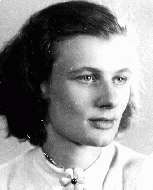
-
Rozia Grynbaum
ID CardRozia was the second-oldest of nine children born to religious Jewish parents in Starachowice, a town in east-central Poland. Their small one-story house served as both the family's residence and their tailor shop. The tailoring was often done in exchange for goods such as firewood or a sack of potatoes. Rozia worked in the shop sewing women's clothing. 1933-39: Rozia married a Jewish tailor from Radom, a large town some 60 miles south of Warsaw. The couple settled in Starachowice, and they ran a tailor…
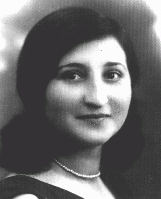
-
Notice of Gregor Wohlfahrt's execution
DocumentAuthorities in Berlin, Germany, sent this notice to Barbara Wohlfahrt, informing her of her husband Gregor's execution on the morning of December 7, 1939. Although he was physically unfit to serve in the armed forces, the Nazis tried Wohlfahrt for his religious opposition to military service. As a Jehovah's Witness, Wohlfahrt believed that military service violated the biblical commandment not to kill. On November 8, 1939, a military court condemned Wohlfahrt to beheading, a sentence carried out one month…
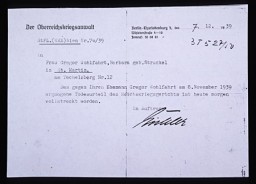
-
American propaganda announcement
DocumentAnnouncement dropped by American planes on Shanghai near the end of the war. [From the USHMM special exhibition Flight and Rescue.]
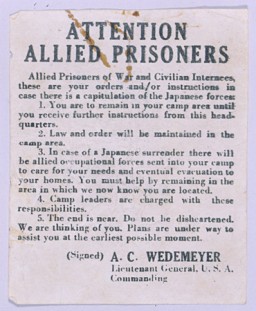
-
Josef Deutsch
ID CardJosef was born to Yiddish-speaking, religious Jewish parents in the town of Viseu de Sus in Transylvania, a region of Romania that belonged to Hungary until 1918. In 1890 he married Emma Geisler from the nearby town of Bistrita. The couple had four children and after 1910 the family lived at #4 Hid Street in Viseu de Sus. Josef was a merchant who owned a stall in Viseu de Sus's public market. 1933-39: By 1939 two of Josef's grown sons had moved to the Hungarian capital of Budapest. Josef and his wife…
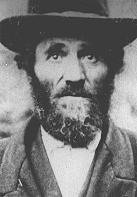
-
Dismissal letter
DocumentDuring the interwar period Dr. Susanne Engelmann served as the principal of a large public high school for girls in Berlin. This letter notified her of her dismissal, as a "non-Aryan," from her teaching position. The dismissal was in compliance with the Civil Service Law of April 7, 1933. On April 7, the German government issued the Law for the Restoration of the Professional Civil Service (Gesetz zur Wiederherstellung des Berufsbeamtentums), which excluded Jews and political opponents from all civil…
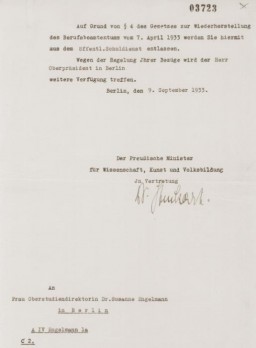
-
Advertisement for the Violetta women's club
DocumentA newspaper advertisement for the Damenklub Violetta, a Berlin club frequented by lesbians, 1928. Before the Nazis came to power in 1933, lesbian communities and networks flourished in Germany.
